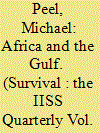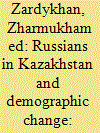|
|
|
Sort Order |
|
|
|
Items / Page
|
|
|
|
|
|
|
| Srl | Item |
| 1 |
ID:
122012


|
|
|
|
|
| Publication |
2013.
|
| Summary/Abstract |
Gulf states and sub-Saharan African countries have begun to forge closer economic ties over the past few years. This process, amid financial crisis in the West and strong growth in Africa, provides a platform for an important new inter-regional geopolitical power play.
|
|
|
|
|
|
|
|
|
|
|
|
|
|
|
|
| 2 |
ID:
122011


|
|
|
|
|
| Publication |
2013.
|
| Summary/Abstract |
Africa is booming. Of that, there is little doubt. One feels it every time one lands in Lagos, Addis Ababa, Nairobi or Accra. Hotels are filled to the brim and business-class seats are sometimes hard to come by. Companies are struggling to fill executive positions because they are growing so rapidly. The energy on the streets is palpable, and the rest of the world is noticing. A recent issue of the Economist, for example, led with an article on 'Aspiring Africa' and included an advertisement for an Africa-focused conference in Dubai.1 This followed the first The Times CEO Summit Africa, held in Geneva earlier this year, and the first New York Forum Africa, which took place in Gabon in 2012 and brought over 500 global business leaders to the tiny West African nation. Events such as the IISS forum 'The Geo-economics of Resources and Conflict in Africa', held in Bahrain in April, also show that the world's perception of Africa is changing.
|
|
|
|
|
|
|
|
|
|
|
|
|
|
|
|
| 3 |
ID:
132093


|
|
|
| 4 |
ID:
117585


|
|
|
|
|
| Publication |
2012.
|
| Summary/Abstract |
In 1997 we first offered American government classes online as well as face-to-face classes. We administered pre- and posttests to our students to measure their general knowledge of American government, political attitudes, demographics, and some behaviors. Following an initial report in 2001, we continued to gather data for 10 more years; this current study covers nearly 3,200 students during 13 years. We examine the sample as a whole and changes in audiences and outcomes, over time, for the two teaching formats. Although the kinds of students taking online classes have become more similar, a few differences persist. Learning outcome differences continue to be insignificant. Neither format has a clear advantage in students' changes in attitudes, but the online classes increased students' newspaper reading. Class dropout rate and faculty workload both favor face-to-face classes, but flexibility in scheduling and student demand clearly favor online classes.
|
|
|
|
|
|
|
|
|
|
|
|
|
|
|
|
| 5 |
ID:
124657


|
|
|
|
|
| Publication |
2013.
|
| Summary/Abstract |
International development has moved beyond charity. Gone are the days when the United States would just spend its seemingly bottomless largess to help less fortunate or vanquished countries, as it did after World War II. International development has reached a new, globally competitive stage, bringing with it enormous strategic and economic implications for the United States in the years ahead.
According to the Organization for Economic Cooperation and Development (OECD), the global middle class will grow from an estimated 1.8 billion people in 2009 to 4.9 billion in 2030. Nearly all of that growth will occur outside Europe and North America, from Brazil, China, and India to countries in the Middle East, North Africa, and Southeast Asia. Eighty-five percent of the growth will come in the Asia-Pacific region alone. The priorities of those countries will change along with their demographics. With more people escaping poverty, governments' focus is shifting from meeting basic needs to ensuring longer-term economic prosperity. Instead of handouts, nations are looking for investments to keep their middle classes employed. And more often than not, those investments are for infrastructure that enables and sustains growth.
|
|
|
|
|
|
|
|
|
|
|
|
|
|
|
|
| 6 |
ID:
072493


|
|
|
|
|
| Publication |
2006.
|
| Summary/Abstract |
This paper attempts to use available demographic data to cast light on trends indicative of, or potentially supportive of, an accretion of security threats from what has been termed "the U.S. southern security perimeter": the USA's interface with Latin America and the Caribbean. Available data on fertility, urbanization, religious affiliation and migration suggest that many local demographic trends defy prevailing North American stereotypes for the region-and that the significance of these emerging trends thus remains imperfectly recognized and poorly appreciated in Washington.
|
|
|
|
|
|
|
|
|
|
|
|
|
|
|
|
| 7 |
ID:
168663


|
|
|
|
|
| Summary/Abstract |
The performance of energy service providers has important environmental and safety consequences in local communities. This paper uses a novel dataset compiled from operator reports and infrastructure monitoring data obtained from three different US federal agencies to assess the performance of retail gas utilities nationwide in terms of addressing gas leaks and minimizing leaked volume. Our panel data set includes yearly observations for 727 retail gas utilities from 2009 to 2017. We show that safety hazards and environmental costs of gas leaks are widespread across providers that vary in terms of ownership, size, and region. We then use a series of Bayesian hierarchical models to regress four outcome variables—hazardous leaks, end-year unfixed leaks, total gas volume leaked, and significant incidents—on infrastructure conditions, regional service context, and socio-economic service population characteristics. Unlike what is observed in other critical infrastructure cases such as drinking water, socio-economic conditions are not strongly predictive of service outcomes. Additionally, public utilities exhibit better environmental performance on average, and no difference in maintenance backlogs. Because the environmental costs of poor performance--primarily in terms of methane greenhouse gas emissions--are predominantly social, policy tools such as consolidation and privatization are unlikely to improve environmental outcomes.
|
|
|
|
|
|
|
|
|
|
|
|
|
|
|
|
| 8 |
ID:
182742


|
|
|
|
|
| Summary/Abstract |
Researchers have long puzzled over China's high household savings rate. Some have hypothesized that the explanation lies with China's One-Child Policy (OCP). According to this hypothesis, faced with fewer children to support them in their old age, Chinese parents increased their savings to finance retirement. Previous research relied on empirical studies of the relationship between children and saving behavior. However, all of these studies based their analysis on data after the OCP was implemented. Their implicit counterfactual for China without an OCP was households with multiple children living in an OCP environment. In contrast, we compare Chinese people with people from regions that do not have restrictive population policies. These regions share many cultural, demographic and economic characteristics with China that suggest they can be used as a counterfactual for China. This approach enables us to employ a Blinder-Oaxaca decomposition procedure to identify the different channels by which children could affect savings. Our results suggest that the OCP decreased households' proclivity to save. The estimated effects are generally small, in the range of one to two percentage points. We find no evidence to indicate that the OCP can explain China's high saving rate. An implication of our findings is that they suggest that the recent relaxation of the OCP cannot be counted upon to substantially boost Chinese consumption.
|
|
|
|
|
|
|
|
|
|
|
|
|
|
|
|
| 9 |
ID:
145250


|
|
|
|
|
| Summary/Abstract |
As tempting as it is to forecast the Mediterranean's future through the bleak lens of its present, it is unwise to do so. Over and again throughout history, writing the future through the linear extrapolation of contemporary trends has proven foolish. This essay identifies the most critical socioeconomic, political, ecological, and geopolitical drivers of change that together will shape the Mediterranean's future. It analyzes the possible impacts of three major trends (demographic imbalance, ongoing empowerment, and rising natural resource stresses) and three critical uncertainties (the future of collective identity, the role of distant global powers, and economic turbulence).
|
|
|
|
|
|
|
|
|
|
|
|
|
|
|
|
| 10 |
ID:
156247


|
|
|
|
|
| Summary/Abstract |
Russia, cyberterrorism, Da’esh are among the most quoted challenges to NATO mentioned in the organizations’ documents, specialized literature and newspaper articles. How about a subtler, less striking but real challenge like demographic change? Demographic trends are increasingly recognized as relevant in understanding international politics and particularly international security, but only seldom taken into consideration when dealing with NATO’s future challenges. NATO, hence, suffers from the limits of a political–military institution designed for a post-Second World War demographic and security context that is changing drastically – and is expected to change even more in the foreseeable future. The aim of this article is to explore the current and projected demographic trends at the global level, evaluate their security implications and then draw inferences for the challenges and opportunities that will arise for NATO out of the sketched scenarios. Based on this analysis, we posit that the Alliance is facing a demographic paradox, whereby it is increasingly unable to cope with external demographic challenges because internal demographic changes are weakening the cohesion needed to provide an effective response.
|
|
|
|
|
|
|
|
|
|
|
|
|
|
|
|
| 11 |
ID:
166390


|
|
|
|
|
| Summary/Abstract |
Geospatial modelling is extensively used to identify suitable sites for the installation of onshore wind turbines, with the starting point being the estimate of exploitable resource. However, there are concerns that such approaches do not accurately consider the social issues surrounding such projects, resulting in large numbers of projects subsequently being rejected at the planning permission stage. Using the location of 1721 historic wind turbine planning applications in Great Britain, this paper explores whether the planning success of proposed wind turbine projects can be better predicted using a range of geospatial, social and political parameters. The results indicate that the size of the project, local demographics and the proximity to existing wind turbines are key influences affecting planning approval. The paper demonstrates that quantitatively linking local social and political data enhances the prediction of the planning outcome of wind turbine proposals, and highlights that geospatial parameters are necessary but in isolation, not sufficient for assessing the suitability of potential sites. These results also suggest that national policy is restricting the development of onshore wind energy in regions which appear generally supportive of wind energy.
|
|
|
|
|
|
|
|
|
|
|
|
|
|
|
|
| 12 |
ID:
051455


|
|
|
| 13 |
ID:
127320


|
|
|
|
|
| Publication |
2014.
|
| Summary/Abstract |
Conflicts between religious groups are hardly new. But the latest round of sectarian violence arises not from religious doctrine but in large part from the weakness of governments and institutions.
|
|
|
|
|
|
|
|
|
|
|
|
|
|
|
|
| 14 |
ID:
122010


|
|
|
|
|
| Publication |
2013.
|
| Summary/Abstract |
Dr Ngozi Okonjo-Iweala is a renowned development economist and reformer who has served the Nigerian government and World Bank for most of her career. In her current role, Dr Okonjo-Iweala is responsible for managing the finances of Africa's most populous nation and one of the world's fastest-growing economies. She gave the 2013 Oppenheimer Lecture at Arundel House, London, on 19 June 2013.
|
|
|
|
|
|
|
|
|
|
|
|
|
|
|
|
|
|
|
|
|